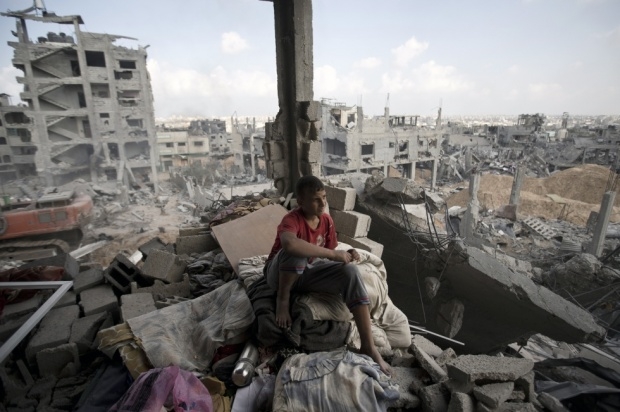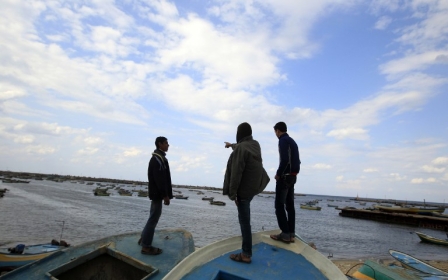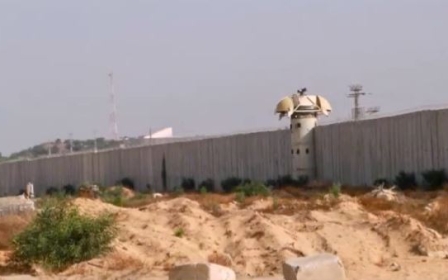'If you spot someone, shoot': Israeli soldiers describe Gaza war

A human rights group in Israel released a 237-page report on Monday including the testimonies of more than 60 soldiers which it says provides evidence the Israeli army may have committed “grave violations” of international law during their assault on Gaza last summer.
Unnamed soldiers told Breaking the Silence, a group comprised of serving and former Israeli soldiers, that all Palestinians - civilians and fighters alike - were considered "targets" and that the invading Israeli forces wantonly destroyed swathes of Gaza’s residential areas.
More than 2,100 Palestinians were killed in Israel’s 50-day war against Hamas - an estimated 70 percent of casualties were civilian - and some 18,000 homes were destroyed or severely damaged. On the Israeli side 66 soldiers and six civilians were killed.
Several testimonies given to Breaking the Silence describe the complete absence of rules of engagement in the war, and include allegations that Palestinian civilians were considered terrorists in Gaza.
“The rules of engagement for soldiers advancing on the ground were: open fire, open fire everywhere, first thing when you go in,” said one infantry soldier who operated in Gaza City.
“The assumption being that the moment we went in [to Gaza], anyone who dared poke his head out was a terrorist.”
Other accounts include allegations that Israeli troops were briefed by senior officers to open fire on anyone they came across in the coastal enclave.
“There weren’t really any rules of engagement. It was more protocols,” said another infantry sergeant, whose unit was in northern Gaza.
“They told us, ‘there aren’t supposed to be any civilians there. If you spot someone, shoot.’ Whether it posed a threat or not wasn’t a question, and that makes sense to me. If you shoot someone in Gaza, it’s cool, no big deal.”
Breaking the Silence said the rules of engagement were "the most permissive" they had ever heard.
Despite the high number of civilian casualties, senior officers allegedly held debriefings where they spoke of the many “achievements” made during the devastating assault.
“You could say they [the senior officers] went over most of the things viewed as accomplishments,” said a combat intelligence corps sergeant, who served in northern Gaza.
“They spoke about numbers: 2,000 dead and 11,000 wounded, half a million refugees, decades worth of destruction […] We were also told that what has emerged is a picture of the people [of Israel] at their finest hour, the civil unity, the [national] consensus.”
Soldiers said they believed there would be no civilians left in Gaza’s urban areas – one of the most densely populated areas of the world – because Israeli forces had dropped leaflets and made phone calls to local residents ordering them to leave their homes.
The testimonies also revealed that soldiers saw the Gaza assault, named Operation Protective Edge in Israel, as an opportunity to simply attack Palestinians.
“The motto guiding lots of people was: ‘Let’s show them',” said a lieutenant who served in the southern town of Rafah. “It was evidence that was a starting point. Lots of guys who did their reserve duty with me don’t have much pity towards [the Palestinians].”
“There were a lot of people there who really hate Arabs. Really, really hate Arabs. You could see the hate in their eyes.”
Soldiers also said that after fighting in Gaza for several weeks “good and bad get a bit mixed up, and your morals get a bit lost and you sort of lose it, and it also becomes a bit like a computer game, totally cool and unreal.”
One sergeant reflected on how he had shot a machine gun at a man on a bicycle.
“I saw a cyclist, just happily pedalling along,” he said. “I said OK, that guy I’m taking down. I calibrated the range, and didn’t hit – it hit a bit ahead of him and then suddenly he starts pedalling like crazy, because he was being shot at, and the whole tank crew is cracking up, ‘Wow, look how fast he is.’”
Israeli leaders have repeatedly denied their forces broke international law during the 2014 Gaza assault, which they said was aimed at ending rocket fire into Israel by Hamas and other militant groups from the coastal enclave.
Two American lawyers given “inside access” to the Israeli army recently released a report that concluded the Gaza assault complied with international law. However, Breaking the Silence made contradicting remarks in their research.
The Israeli rights group said their findings had drawn a “very disconcerting picture” about Israeli soldiers’ actions in Gaza and cast “grave doubt on the IDF’s (Israeli army) ethics.”
“From the testimonies given by the officers and soldiers, a troubling picture arises of a policy of indiscriminate fire that led to the deaths of innocent civilians,” said Yuli Novak, director of Breaking the Silence.
“We learn from the testimonies that there is a broad ethical failure in the IDF’s (Israeli army) rules of engagement, and that this failure comes from the top of the chain of command, and is not merely the result of “rotten apples.” As officers and soldiers, we know that internal military investigations scapegoat simple soldiers rather than focusing on policy.
The (Israeli) public must know what missions its sons are being sent to carry out, and according to which norms the IDF acts in its name. We call for the establishment of an investigative committee external to the IDF, which will investigate the policy behind the rules of engagement given during “Protective Edge,” and the norms and values that stand at the base of this policy.’’
The Israeli army released a statement in response to Breaking the Silence's report, which questioned its accuracy.
"The IDF is comitted to properly investigating all credible claims raised via meda and NGOs," it said.
"Unfortunately, as in the past, Breaking the Silence has refused to provide the IDF with any proof of their claims. For obvious reasons such conduct makes any investigation by the relevant IDF bodies impossible."
The Israeli army is currently looking into allegations of misconduct, including the shelling of a United Nations school.
A UN report last week found Israel responsible for targeting UN-run schools seven times last summer, attacks which killed dozens of Palestinians who were sheltering there.
New MEE newsletter: Jerusalem Dispatch
Sign up to get the latest insights and analysis on Israel-Palestine, alongside Turkey Unpacked and other MEE newsletters
Middle East Eye delivers independent and unrivalled coverage and analysis of the Middle East, North Africa and beyond. To learn more about republishing this content and the associated fees, please fill out this form. More about MEE can be found here.




